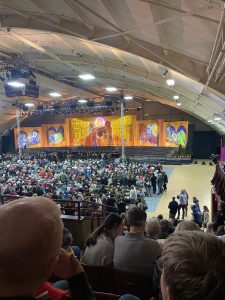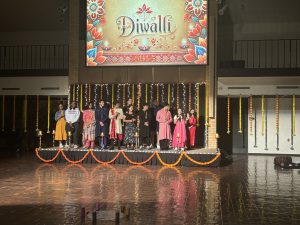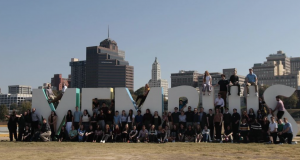Wayne Besen was walking through a store with his parents when they saw a stand selling tapes with the sign “Gay and Unhappy?”
“That’s you!” his parents said.
“But I’m happy,” Besen replied.
“No you’re not—take it,” they said.
Besen took the tape and listened to it. He described it as something akin to anti-gay Enya. As a helpful tool for unhappy gays, it repeated phrases such as “You like women. You like breasts. You like the way they smell.” Surprisingly enough, it was ineffective. Besen remains gay and is now on an 11-state tour, attempting to “Unmask the ‘Ex-Gay’ Myth.”
“My parents aren’t even religious, and they fell for it,” said Wayne Besen, activist, columnist, public speaker, founder of the organization Truth Wins Out and author of the book “Anything But Straight: Unmasking the Scandals and Lies Behind the Ex-Gay Myth.”
Besen spoke at Concordia College last Tuesday to a large crowd. About 100 people attended, according to Andrew Eilola, president of SAGA. Eilola partnered with the Office of Intercultural Affairs and the Pride Collective & Community Center to bring Besen to Concordia.
Nikoli Falenschek, senior at Concordia, became aware of the event through a Facebook invitation.
“I saw ‘Pray Away the Gay,’ in the heading, and I was offended,” Falenschek said. “I thought, ‘it can’t be!’ But then I did some research and it really interested me, so I went.”
Alex MacArthur, junior at Concordia, heard about the event through Eilola and was intrigued.
“It’s an issue I have strong opinions about,” MacArthur said. “I didn’t know much about the ex-gay industry, so I went out of pure interest and lack of knowledge.”
At the beginning of his presentation, Besen broke the ice with a clip from Jon Stewart’s “Diagnosis: Mystery,” where Besen played the role of patient, suffering from chronic gay.
In this clip, Richard Cohen, certified sexual reorientation coach, demonstrated different methods he uses with patients. These methods were bioenergetics—beating a pillow and yelling the name of a parent—and touch therapy—the coach sitting on a couch, hugging a laying patient. The clip ends with Besen post-treatment, making out with a man.
Kyle Meerkins, senior at Concordia, thought the videos used in Besen’s presentation were effective, especially Stewart’s.
“I appreciate it when Jon Stewart takes up these issues in a satirical lens,” Meerkins said, “but the reality is that this therapist was telling [Stewart] his real tactics in therapy. We’re laughing, but it’s comical in a depressing way.”
Meerkins knew a bit about the ex-gay industry going into the presentation, because some of his friends had personal experiences with their programs.
“I have a couple of friends who went to the camps,” Meerkins said. “It’s caused them traumatic psychological effects later in life. It’s shocking to find out about the people who started these camps coming out later.”
Falenschek was also disturbed by some of the information Besen presented.
As part of his talk, Besen listed some bizarre tech-niques that ex-gay organizations list and promote as ways to become straight. These included touch football, drinking Gatorade, calling friends ‘dude,’ replacing stylish underwear with baggy cotton boxers and imagining having sex with Jesus.
“Some of the things they do at these camps…” Falenschek said. “As a very religious person, this ‘imagine having sex with Jesus’ thing was just not okay.”
Something that struck MacArthur about the presentation was some of the contradictions in the wording that ex-gay industries use.
“The things [Besen] showed and said were mind-blowing,” MacArthur said. “These organizations say change is possible, but then they’re quoted saying they can’t change you—they just facilitate God’s work. They need to examine some of their rhetoric.”
Some students were disappointed by aspects of the presentation.
“He exposed individuals but didn’t delve into why it’s a myth,” MacArthur said. “I wanted more empirical evidence showing it’s a myth, instead of just individual cases.”
Meerkins expressed regret that the discussion at the end of Besen’s presentation wasn’t more varied.
“For a lot of us, we’re totally agreeing with him,” Meerkins said, “but it would’ve been more interesting with more discussion. There’s a pretty huge population who see things differently, and it would’ve been interesting to talk with them.”
The event sparked reactions in a few, and a couple students voiced their thoughts about Besen’s presentation.
“My viewpoint hasn’t changed,” MacArthur said. “But I gained a different perspective.”
Others came away with from the event with a new attitude. A day later, Falenschek was still enthusiastic about the presentation, and said he had been telling everyone he saw about Besen and the ex-gay industry.
“[Besen] was passionate and made me passionate,” Falenschek said. “I was supposed to go skating afterwards, but I was too fiery for it—so I went to Cold Stone instead.”







Be First to Comment